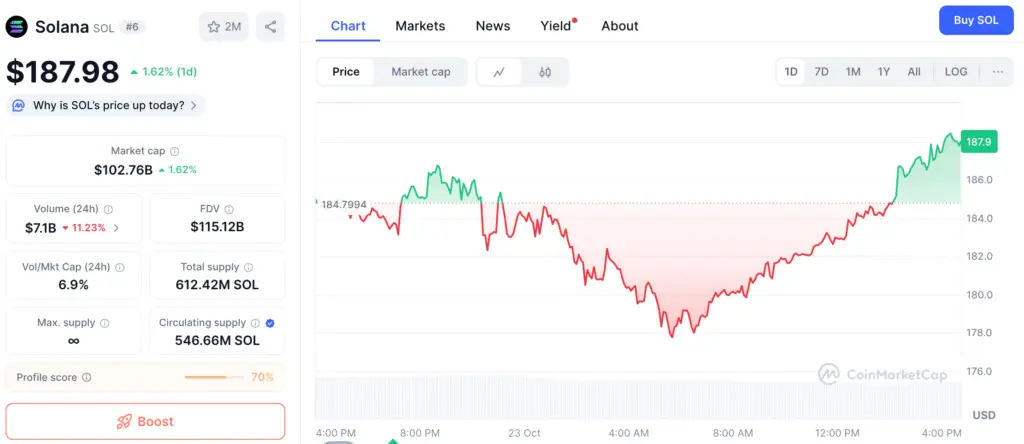How Solana is Changing Payroll with Blockchain Technology
Solana’s new technologies are bringing in a new era of digital payroll systems that combine speed, security, and openness. As more and more fintech businesses look at blockchain-based payments, Solana stands out because it can execute transactions quickly and doesn’t charge high fees. This kind of efficiency might change the way payroll works by allowing settlements to happen very instantly and cutting down on administrative expenditures by a large amount.
The rise in interest in crypto payroll shows that people are moving toward payment systems that don’t have borders and are decentralized. Solana’s blockchain infrastructure is built to be scalable, which means that entrepreneurs may pay people all around the world without having to use traditional middlemen. This change in thinking puts Solana at the top of the list of companies that help people with money and new ways of doing things in payroll technology.

Crypto Payroll Gains Momentum Amid Digital Transformation
As part of a larger effort to make businesses more efficient, fintech entrepreneurs are starting to use crypto payroll. Cryptocurrencies like Solana make it easier to send money across borders quickly and with no hassle. These benefits are especially helpful for businesses that have remote staff or contractors in more than one country.
Also, the fact that smart contracts may automate regular payments fits nicely with the financial industry’s push for openness and safety. Startups can trust that Solana’s network will always operate well, so they may use crypto-based payroll solutions for both domestic and foreign operations.
Solana’s Price Stability Encourages Broader Adoption
Businesses who are thinking about using blockchain for payroll are more confident now that Solana’s price has stabilized. Analysts say that SOL has been stable at an important multi-year support zone, which might mean that it is getting stronger after a turbulent correction. This steadiness gives startups looking for dependable ways to pay their employees peace of mind.
Solana is a better alternative than other cryptocurrencies that are more volatile since its assets are steady. Fintech organizations that have to stick to restricted budgets may think about adding Solana-based payroll systems to their business models since they lower the danger of unexpected devaluation.
Recommended Article: Solana Risks Breakdown as Price Tests Key $125 Support
Balancing Opportunities with Volatility Risks
Even though Solana has some intriguing use applications, its price changes are still a big worry for firms looking into crypto payroll. Even simple changes can affect how accurate payroll is and how small businesses arrange their finances. This uncertainty frequently keeps people from using it widely until better hedging tactics come along.
To lower risks, businesses may use a mix of Solana payments and stablecoins or fiat settlements. This balance lets you be flexible in your operations while taking advantage of Solana’s fast transactions without being fully exposed to market volatility.
Regulatory Challenges and the Path to Compliance
Fintech companies that use blockchain-based payroll systems still have a hard time figuring out how to follow cryptocurrency rules. Many places are still working out how to tax digital assets, disclose them, and stop money laundering. Because of this uncertainty, early adoption is both a chance and a calculated risk.
But as Solana’s market matures, it might speed up regulatory clarification as governments become used to new blockchain technology. Startups who set up compliance standards today will probably have an edge over their competitors when clearer rules come out throughout the world.
Technical Reliability Strengthens Solana’s Payroll Appeal
Solana has a distinct advantage over other networks because it is known for having fast throughput and low transaction costs. Its design can handle tens of thousands of transactions per second, which makes sure that salaries are paid on time even when the network is busy. This constancy in performance makes payroll solutions for businesses more trustworthy.
Still, entrepreneurs need to be on the lookout for possible technological problems, as prior failures show how important backup systems are. Keeping backups of operations and a variety of infrastructure can help keep payroll going even when the network slows down unexpectedly.
The Future of Payroll: Solana at the Core of Fintech Innovation
As financial businesses keep looking at blockchain payroll, Solana is becoming the most popular platform for decentralized wage systems. Its speed, low cost, and ability to adapt to new technologies make it a good fit for today’s worldwide enterprises.
As regulatory and volatility risks are high, the road ahead will demand a balance between being careful and being innovative. But for adaptable firms, adding Solana to payroll systems might make them more efficient, scalable, and accessible across borders than anything else. In a crypto economy that is changing quickly, Solana may soon be the main part of payroll administration for the next generation.













